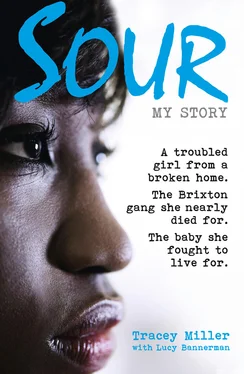She had her own money and her uniform, man, I’ll never forget it – she had sexy tops and pencil skirts that were cowled round the waist. I thought, wow, this looks exciting. She seemed like girly fun.
Boy, was I wrong. Melanie liked partying, she liked her freedom, and she didn’t have no time for irritating siblings. Most of all, she really didn’t appreciate taking orders from an unhinged reggae fan who liked to walk round the estate naked. Her rows with Mum were vicious. She might not have been dangled off a balcony, but soon Melanie too realised Roupell Park was not for her. She lasted about six months before storming out and slamming the door behind her, without so much as a goodbye.
“Two bulls cyaan’t live inna one pen.”
That was all I remember Mum saying about the matter of another lost daughter, and Mel was soon forgotten as quickly as she had appeared. Thankfully, she left behind at least one spangly top in the washing machine.
I’d pose in front of the mirror, with socks stuffed down my front, looking forward to the day I’d be able to get dressed, look fly and hit the dancehall scene.
“You was such a lovely-looking baby,” she used to tell us at least once a day.
I preferred Yusuf’s company to the girls’. He should have been a comedian, man. We would stay up and talk all goddamn night. When we got the car bed – all red wooden wheels and a spoiler instead of a headboard – we’d spend so long wrestling over the quilt, we’d end up falling asleep in it together. Eventually, we forgot about the nightly fight for the driver’s pillow, and just topped and tailed it together.
As all baby brothers should, he worshipped his big sister. Quite right too. Anything I did, he wanted to do too.
If I wanted to take conkers and throw them at passers-by from the balcony, he would join in.
Ice cubes, eggs, anything we could get our hands on. What’s the point of having a balcony, if you can’t throw shit at people walking by?
We’d wait for the distant explosion of rage to come from the kitchen – “Where’s my fucking eggs?” – then hightail it to the caged football pitch area we called the Pen.
Ivy, the old Jamaican lady who was our first foster carer, was a spiteful old witch. She lived in Peckham, and looked elderly and sweet like somebody’s nan, but truly was the meanest woman I’d ever met. She salted our food to stop us eating too much and keep the food bills down – even over-salted the Wotsits, the bitch.
Her house smelled medieval, like the scent of an old woman, with everything velvet. Velvet curtains, velvet tablecloth, velvet wallpaper. She beat up her grandson, poor kid. He could barely look you in the eye. Made him hoover the house every day, the mad old bat. Once he made the mistake of using the hoover to try and remove a stain from her precious velvet wallpaper, so she caught him and beat him with a stick.
I ain’t letting my little brother stay some place like this, I decided. So we packed our bags and got ready to escape. Her poor grandkid pleaded to come with us.
“Please,” he said. “I don’t have money now, but when I do, I’ll pay you, hand up to God.”
He held his right hand up to the wallpapered ceiling, just in case we didn’t believe him.
“We don’t want to leave you here, honest we don’t, but we can’t take you with us.”
I told him we had to think about ourselves. He didn’t argue much after that.
We must have told the social workers about it, because later we heard that Ivy had been shut down. Wonder what happened to that poor kid. I hope he strangled the old witch and buried her in a velvet coffin in the back garden.
The next time we were sent to Birmingham to stay with a nice Muslim family, that was much more like it.
The woman’s husband looked like a real-life gorilla, big and fat and hairy, but he was lovely. They had twin daughters who they treated real nice. It felt like the middle of nowhere, though, and we couldn’t understand a word anyone was saying, so we were glad to get back home, where we understood people. Still, I missed their garden and the pistachio cakes the mother made.
Yusuf liked the residential care home the best, well, until, that is, the others discovered he still sucked his thumb. It was just like the “Dumping Ground” in the Tracy Beaker books, but with a lot more toast. Toast, toast, toast – that was all there was to eat in between meals, but at least they let you make your own meals and do your own thing. Felt like a proper little adult.
It wasn’t perfect, but it was better than living on eggshells, waiting for that music to be cranked up.
Sure, there were other angry kids raging against the system and setting off the alarms, but mostly it was just peace and quiet, innit. I was disappointed the day they came to take us home from there, but like it or not all roads led back to Roupell Park.
Mum was standing in the front room waiting for us. On the glass table was a bumper pack of Squares, and steaming plates of chicken, rice and plantain. I could see she’d spent the day cleaning. The whole house was shining.
“My babies!” She put an arm round each of us and pulled us close. “De doctors say I’m better. Gonna take my medication and mi ago do much better this time.”
She hugged us tight, and pressed her face into our hair.
“What you smelling us for?”
“I missed your smell.”
It wasn’t long after we returned from the care home that Mum made her big announcement.
We were going to move. Our eyes lit up.
“For real?”
“For real.”
We spent the whole day packing up our stuff, asking questions about our new home.
“You’ll see,” said Mum, with a smile on her lips.
“How are we going to take the car bed? We can’t go without the car bed,” said Yusuf, sensibly.
“Don’t worry about dem things. Removal men will pick ’em up later.”
We took our bags outside.
“Please, please,” we begged. “Tell us where we’re going.”
“OK. You ready?”
She pointed across the Pen.
“Tird floor. Block D.”
Our hearts sank. So much for the Big Move. We weren’t even making it out of the estate. We carried our stuff in boxes 100 metres across the grass of the courtyard, to the opposite block on the other side of the estate. We were moving from the ground floor of Elmstead House to the third floor of Deepdene House. We were moving up in the world, if only literally.
No removal van ever did pick up the car bed.
You see, gangland is a small, claustrophobic place. It exists in small, sealed bubbles, squatting in boarded-up worlds no bigger than a postcode. It doesn’t like big, wide battlefields. It’s the smallness it likes, lurking in the dead ends and shadows of shortened ambitions, conducting its business underneath stunted horizons.
No shit. They don’t call them “the endz” for nothing.
For me, gangland began in that third floor flat, flanked by the concrete blocks of Roupell Park estate.
Later, my mental map would expand along the south London bus routes to include the lawless walkways and basement garages of the Angell Town estate, and the bored evenings making trouble around Myatt’s Fields and Brockwell Park. Feuds would stretch to Peckham and Stockwell, New Cross and Brixton.
But as a young teenager, the meaning of those postcodes beyond Roupell Park simply didn’t exist. I had not yet learned that language. They were not yet “territories”. They were still simply postcodes.
I liked Roupell Park. It didn’t feel like complete poverty, not like some of the slums in Peckham and Stockwell, the ones with the dark, dismal feeling that you’re too scared to walk through.
In Roupell Park, there was still a mixture of cultures, black and white. Some people still took pride in their window boxes, spiking them with those windmill sticks and dangling chimes from their doors. A caretaker kept the Pen tidy, and the Quaker meeting house round the corner gave us a spiritual veneer.
Читать дальше












